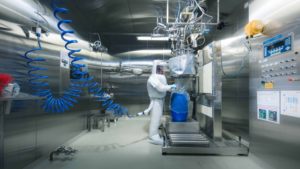Tumour-associated bacteria co-migrate to metastatic sites
The same bacteria present in primary tumours of patients with colorectal cancer are also present in liver metastases, according to a new study. What's more, presence of the bacteria was found to correlate with tumour growth.
Previous studies found Fusobacterium nucleatum abundant in human colon cancers. To explore whether colon cancer that has spread to other parts of the body also harbors the bacteria, US and Spanish researchers analysed samples of primary tumours and corresponding liver metastases in colon cancer patients.
They not only confirmed the presence of Fusobacterium in the metastases, but found that the strains were highly similar to those found in primary tumors of the same individual. Notably, patients who did not have Fusobacterium within their primary tumors also lacked the bacteria in their metastases. When the researchers transplanted Fusobacterium-positive tumors into mice, the tumors took hold, whereas tumors lacking the bacteria did not. Lastly, antibiotic treatment of mice with Fusobacterium-positive tumors reduced the amount of Fusobacterium in the tumours and slowed tumor growth.
Based on these results, the authors speculate that Fusobacterium travels with metastatic tumour cells to distant organs, perhaps aiding their colonisation at these sites. In 2011, researchers discovered that Fusobacterium flourishes in colon cancer cells, and is often also associated with ulcerative colitis. The bacterium, which is part of the placental microbiome is susceptible to the antibiotic clindamycin.


 ©FabienMalot
©FabienMalot Lonza Group
Lonza Group Vetter Pharma
Vetter Pharma